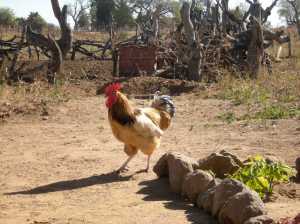Eating with Hungry People
As promised, I’ll continue on with my musings about the food that nourishes my body now that I’ve spoken about the words that come out of it. 
Before I left for South Africa, I began reading “Animal, Vegetable, Miracle,” a book by Barbara Kingsolver, in which her family takes on a year-long project of eating local food—mostly by raising or growing it themselves. I’ll admit, I was a bit too smug pulling it out on airplanes, proud of my choice to read a book that holds up the health, environmental, and social impact our food choices as an important and often ignored subject. As the pages turned, my list of promises of new ways to eat grew: make my own cheese, bake my own bread, buy all organic fruits vegetables and dairy, free range meat. I finished the book here in rural South Africa after dining on a chicken that the previous day had itself dined on my stale bread. My smugness melted considerably as I began to realize just how far I have been removed from the source of my food and how unwilling I’ve been to admit that.
Morally, I’m all for growing methods that create a more sustainable food supply, locally sourced food lessening the environmental impact of dining, and meat that has been treated with respect during both life and death. Practically though, I have a hard time wrapping my wallet and time around what seems like extra effort to change the way I have eaten for so long. That is to say: what I want, when I want it. However, living in a village where most people’s yards are filled with chickens, cows, goats, tomato, corn and spinach for personal consumption, I’ve felt my mindset shift. When I sit at the dinner table, I know that many others in the village will go to bed hungry. When I get out my sandwich at lunch, I know the peanut butter used to make it is viewed as an out of reach luxury for most of my neighbors. When I sit down with my morning oats, I notice that my host brothers and sister are given a fist size bowl of cereal.
Eating what I want when I want it now seems like a luxury. Some would argue that luxury comes as a privilege of being an upper middle class citizen living in a developed country—one to be embraced. But is it also our privilege to destroy our bodies with stress, obesity, and lack of exercise? Sure, but I’ve decided to opt out of that.
Thankfully, I started in an easy place in that I prefer food that is actually food and not the end result of a list of unpronounceable ingredients. With more understanding of what it would actually take for me to kill my own food (still haven’t killed a chicken as I promised to learn in my time here), I have realized that if I can’t bear the thought of where my food actually comes from, then I shouldn’t be eating it. Does this mean that I will return to the States a vegan who prefers her organic granola in a bowl made only of local clay? No. My first stop will likely be Starbucks; and my second Chick-Fil-A, and I know Dorito Nachos will be a standing tradition in our house’s late night snacking. As Kingsolver notes, “The more we know about our food system, the more we are called into complex choices. It seems facile to declare one single forbidden fruit, when humans live under so many different kinds of trees.”
Watching my food run around in the yard all day has made me want to know more about how the meat I’m eating was treated while alive, if the bananas I buy at an astoundingly low19 cents each used hundreds of gallons of fossil fuels, destroyed the natural landscape of a rainforest, and are keeping a poor population in a cycle of dependency to reach me. The price I pay is no longer simply going to be shown on my check out receipt, but in the path it took to get to my plate. Sometimes that price will be worth it, but more often, I expect it won’t. Thankfully, according to Kingsolver’s book, local food is not only more sustainable, better for you and ultimately a lower overall cost to the planet, but best of all, it tastes better.
When you eat with hungry people, it is easier to see your own excess: the places where just because you can do something, doesn’t mean you should. You might be wondering why none of this is about how to get more and a greater variety of food on the tables here in Clare. We are working on some stellar business ideas, which should create jobs, meaning more income, and more, perhaps even better food on more tables. I’m hungry for what’s next.